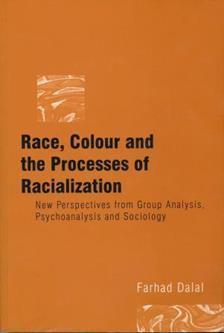Race, Colour & the Processes of Racialization:
From Back Cover
Why should people of one colour come to hate and fear those of another?
So many conflicts appear to be caused by racial and ethnic difference; for example, the cities of Britain and America are regularly affected by race riots. It is argued by socio-biologists and some schools of psychoanalysis that our instincts are programmed to hate those different to us by evolutionary and developmental mechanisms. This book argues against this line, proposing an alternative drawing on insights from diverse disciplines
including psychoanalysis, sociology, social psychology and linguistics, to give power-relations a critical explanatory role in the generation of hatreds.
Farhad Dalal follows Norbert Elias to argue that the primary function of race is to make a distinction between the “haves” and “must-not-haves”, and that this process is cognitive, emotional and political. Examining aspects
of the subject over the past thousand years, Race, Colour and the Processes of Racialization describes how the world and mind were made black and white, covering:
· Psychoanalytic and other theories of racism
· A new theorization of racism based on group analytic theory
· A general theory of difference based on the works of Fanon, Elias, Matte-Blanco, Winnicott and Foulkes
· Application of this theory to race and racism
Farhad Dalal concludes that the structures of society are reflected in the
structures of the psyche, and both of these are colour coded. This book
will be invaluable to students, academics and practitioners in the areas of
psychoanalysis, group analysis, sociology, psychotherapy and counselling.
In reading Farhad Dalal we encounter one of the most original, rigorous and far-reaching minds currently at work in the field of psychotherapy. In this tour-de-force of a volume, going well beyond his ground-breaking Taking the Group Seriously, he draws on psychoanalysis, sociology, mathematics, Biblical scholarship and historiography to expose the utter vacuity of the concept of race, showing how it is used by the powerful to perpetuate their position, and thus how the psyche is inescapably 'colour-coded'. In contrast, he argues convincingly for the group as the matrix from which the individual arises, seeing it as a potentially revolutionary force in an increasingly fragmented society. Black-white racism finally emerges in this work into the world of psychoanalytic psychotherapy, with implications far beyond its manifest subject matter. It is destined to become a 'must read' for anyone with an eye to the future of psychotherapy in the 21st century. Jeremy Holmes
Why should people of one colour come to hate and fear those of another?
So many conflicts appear to be caused by racial and ethnic difference; for example, the cities of Britain and America are regularly affected by race riots. It is argued by socio-biologists and some schools of psychoanalysis that our instincts are programmed to hate those different to us by evolutionary and developmental mechanisms. This book argues against this line, proposing an alternative drawing on insights from diverse disciplines
including psychoanalysis, sociology, social psychology and linguistics, to give power-relations a critical explanatory role in the generation of hatreds.
Farhad Dalal follows Norbert Elias to argue that the primary function of race is to make a distinction between the “haves” and “must-not-haves”, and that this process is cognitive, emotional and political. Examining aspects
of the subject over the past thousand years, Race, Colour and the Processes of Racialization describes how the world and mind were made black and white, covering:
· Psychoanalytic and other theories of racism
· A new theorization of racism based on group analytic theory
· A general theory of difference based on the works of Fanon, Elias, Matte-Blanco, Winnicott and Foulkes
· Application of this theory to race and racism
Farhad Dalal concludes that the structures of society are reflected in the
structures of the psyche, and both of these are colour coded. This book
will be invaluable to students, academics and practitioners in the areas of
psychoanalysis, group analysis, sociology, psychotherapy and counselling.
In reading Farhad Dalal we encounter one of the most original, rigorous and far-reaching minds currently at work in the field of psychotherapy. In this tour-de-force of a volume, going well beyond his ground-breaking Taking the Group Seriously, he draws on psychoanalysis, sociology, mathematics, Biblical scholarship and historiography to expose the utter vacuity of the concept of race, showing how it is used by the powerful to perpetuate their position, and thus how the psyche is inescapably 'colour-coded'. In contrast, he argues convincingly for the group as the matrix from which the individual arises, seeing it as a potentially revolutionary force in an increasingly fragmented society. Black-white racism finally emerges in this work into the world of psychoanalytic psychotherapy, with implications far beyond its manifest subject matter. It is destined to become a 'must read' for anyone with an eye to the future of psychotherapy in the 21st century. Jeremy Holmes
